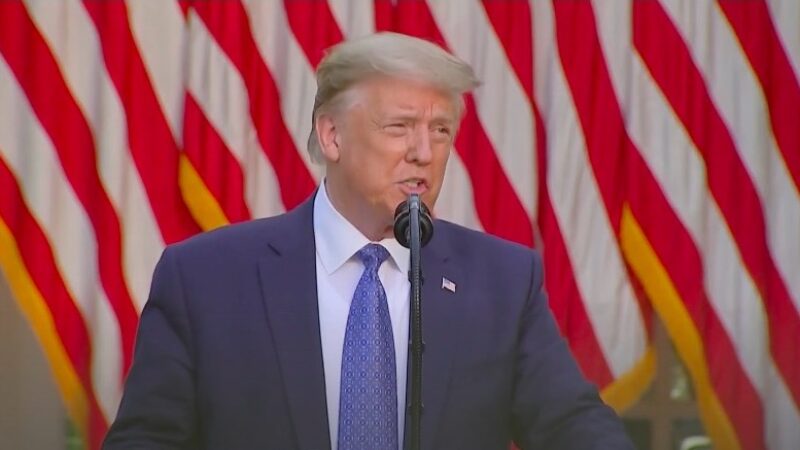
President Trump gave a terrifying statement last night. As he stood in the White House Rose Garden threatening military force against US citizens and describing protests against the killing of George Floyd as “domestic acts of terror”, riot police cleared crowds outside – before the curfew – by firing rubber bullets and tear gas at protesters. We soon discovered why: the President had to walk across the street for a photo opportunity at a church, where he held up a Bible that read “God is love”.
In his speech, Trump promised that law enforcement would “dominate the streets” and vowed to “protect the rights of law-abiding Americans, including your second amendment rights”. (I think we can assume that this reminder of the right to bear arms wasn’t directed at Black Americans.) He wasn’t shy about how this is shaping his electoral strategy either: declaring himself to be “your president of law and order”, comparisons can easily be drawn between 2020 and 1968, when Nixon ran a ‘law and order’ campaign on the back of riots that followed the assassination of Martin Luther King.
Diane Abbott refers to the 1968 civil unrest in her new LabourList piece about George Floyd and the current US protests. Her analysis of the situation extends to the UK: “The British political class need not think that it could not happen here.” Institutional racism in the UK is often downplayed on the basis, for example, that our police officers are usually unarmed. We saw this put on BBC Newsnight to spoken-word artist George the Poet, who in response cited some of the deaths in police custody here. And as new Labour MP Abena Oppong-Asare has raised, the use of police powers during the Covid-19 crisis has disproportionately affected BAME communities.
According to Sky News, the report on the impact of coronavirus on BAME communities has yet again been delayed. Why? Due to “worries” about “current global events”, apparently. As Labour’s Marsha de Cordova said: “If anything, recent events make the release of this report all the more urgent.” The idea that Black people seeking justice in the US would delay the publication of such important findings in the UK, concerning the deaths of many thousands, is an insulting and sickening one.
As parliament returns from recess today, there is plenty of significant parliamentary activity to watch. The government has decided to discriminate against vulnerable MPs and disenfranchise voters by scrapping the Covid-19 virtual Commons. Despite the new online system working well, Jacob Rees-Mogg wants MPs to vote in person and form incredibly long, socially-distanced queues – as if the voting lobbies weren’t already impractical enough. Many are hoping for a government climbdown or a successful amendment. And then, if MPs have enough time after all of that queueing, they are set to consider the new parliamentary constituencies bill. Read Cat Smith’s LabourList piece to find out why Labour is opposed to the reforms.
Sign up to LabourList’s morning email for everything Labour, every weekday morning.



More from LabourList
‘Energy efficiency changes must work for older private renters’
‘Labour’s creative destruction dilemma’
Economic stability for an uncertain world: Spring Statement 2026